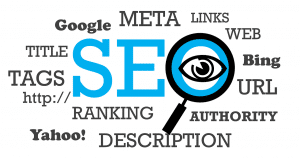Social media is a powerful tool for communication with and connection to your customers. In this multi-part series we have been covering the basics of social media for businesses. In this edition, we’ll dive deeper into gaining website traffic and online visibility for businesses using Search Engine Optimization.
Search Engine Optimization, or SEO, is the key to brand visibility, but it’s complicated. Experts in digital marketing, web engineering, and data sciences have dedicated their entire careers to this field. The information we have here will give you a basic understanding of what search engine optimization is, and how you can use it to boost your business. 
What is Search Engine Optimization?
- SEO refers to increasing the quantity and quality of website traffic through organic (non-paid) search engine results.
- SEO goes beyond just what people type into Google. Understanding how to optimize your pages for search engines relies on a deeper understanding of what people are searching for online, the words they use, and the types of answers and content they’re seeking.
- To increase traffic, you want your content to appear on the right search engine result pages. It doesn’t matter if your page is high ranking for a specific keyword, if the user isn’t getting what they need from it. Search Engine Optimization helps make sure your pages are showing up in the right searches.
Do, Know, Go
To understand SEO, you must know what people are searching for, as well as how and why they are searching for these things. Search Engine Optimization experts categorize the things people search for into three distinct categories: do, know, and go searches.

- Do: “Do” searches are typically made with the goal of completing a transaction, like purchasing a product or service. An example of a “do” search is “flight to Fiji.” This is a “do” because it leads to the action of purchasing a flight to Fiji.
- Know: “Know” searches are information-seeking searches, and while they may be related to product research and future transactions, they don’t have the same transactional nature as “do” searches. For example, “best resort in Fiji” is a “know”search, though it might lead to a later “do” search to book the resort.
- Go: “Go” searches involve users looking for a specific website, such as that of a brand or organization. For example, if a user searches for the Bintan Resort in Fiji, they should be brought directly to that resort’s home page. Suggesting other Bintan resorts would not be helpful.
Your SEO Toolkit
Once you understand the basics of how search engines work and what types of queries are driving traffic to your website and social media pages, there are a few tools that you can use to make sure people are being driven to your site or content: 
- Hashtags are used across all social media platforms, and enhance the users’ ability to find your content. Hashtags are most effective when you want to tie your post to a current event, trend, industry, or location. For example, #OpenInBOS is a hashtag that trends every winter in Boston, Massachusetts to help consumers find restaurants that are open during snow storms. #MondayMotivation is a widely-used hashtag for inspiring content. Figure out what hashtags are best for you by researching what similar businesses use, and by exploring hashtags related to your field.
- Tags are different from hashtags, though they serve a similar purpose. They are specific and detailed descriptions of your content. Viewers browse by tags, but they’re not as time-sensitive, event-focused, or specific as hashtags. For example, a viewer might search for “bridal hair styles”, and they would see content tagged “bridal”, “hair styles”, and “bridal hairstyles”. Each post can have multiple tags, but not all platforms use tags. They are primarily used by YouTube, Facebook, and Pinterest.
- Keywords are the words or phrases used when searching, and relate to your brand, product, or service. On your end, they play a large part in categorizing websites, and can increase relevant search traffic when used correctly. For the user, they help specify what they’re trying to do, learn, or visit. The first step to properly using keywords is to brainstorm what people might search for to find your page, and incorporating that into your titles, descriptions, and content.

- Links refer to the number of times a page has been referenced on a different website. When another website links back to your page, it shows that they appreciate and approve of your content, which helps your pages rank higher on search engines. This does happen organically as people find and re-share your pages, but it can also be achieved through partnerships and reviews.
Search Engine Optimization is an incredibly detailed, ever-evolving field. Because search engines are constantly updating their software and algorithms, it can be difficult to keep up. But you don’t need to be an SEO expert to use it to your advantage – even a beginner can succeed with SEO! Use these tools to support your high-quality content, and you will gain more visibility for your business.